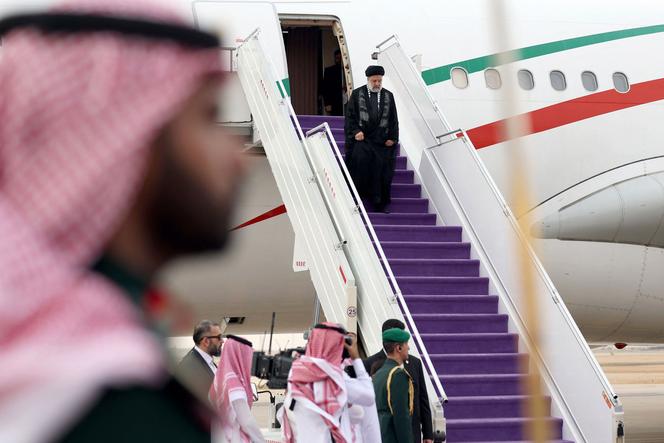


The détente between Saudi Arabia and Iran, signed in March under the aegis of China, was lacking in substance. The war between Israel and Hamas has given it some. Faced with the risk of a regional conflagration, the two rivals are renewing a dialogue interrupted by six years of diplomatic rupture. Four days after the outbreak of war, on October 11, Saudi Crown Prince Mohammed bin Salman, known as MBS, and Iranian President Ebrahim Raisi spoke on the phone for the first time. On Sunday, November 12, Raissi has landed in Riyadh for an emergency meeting of the Organization of Islamic Cooperation.
Saudi Arabia, like its neighbor the United Arab Emirates, does not want to be locked in a hostile confrontation between Iran on the one hand, and Israel and the United States on the other. As the key to de-escalation, dialogue with Tehran does not call into question normalization with Israel, nor their inclusion in a regional security framework under an American umbrella. Nor does the Islamic Republic want a war, despite the attacks by its allies within the "axis of resistance" to Israel. Riyadh can offer it a way out by including it in a diplomatic solution.
The Hamas attack on Israel on October 7 was a hard pill for the Saudi crown to swallow as it has, intentionally or not, suspended negotiations with the Jewish state and eliminated the prospect of additional American security guarantees. The kingdom, already frustrated that Iran has not reconsidered its expansionist ambitions, has lost the illusion of regional security in the shadow of which it could pursue its economic development. Only Washington's heavy military presence now guarantees that Iran, like the United Arab Emirates, which will host COP28 from November 30 to December 12, will not again be attacked by Iraqi militias and Yemeni Houthi rebels.
Abu Dhabi and Doha, which enjoy good relations with Tehran, were the first to receive its de-escalation messages. The eagerness with which Iranian Supreme Leader Ayatollah Ali Khamenei denied any leading role in the Hamas attack was another one. The Gulf states have no illusions about Iran's destabilizing role and ambitions, but direct dialogue with Tehran remains the surest strategy for reducing tensions. "Unlike the Israelis, the Gulf states have understood that confrontation is not a solution. All the more so as American security guarantees are no longer the same and they have been shocked by Israel's weakness," said Fatiha Dazi-Héni, Gulf specialist at the Ecole Militaire's Strategic Research Institute.
You have 60% of this article left to read. The rest is for subscribers only.
